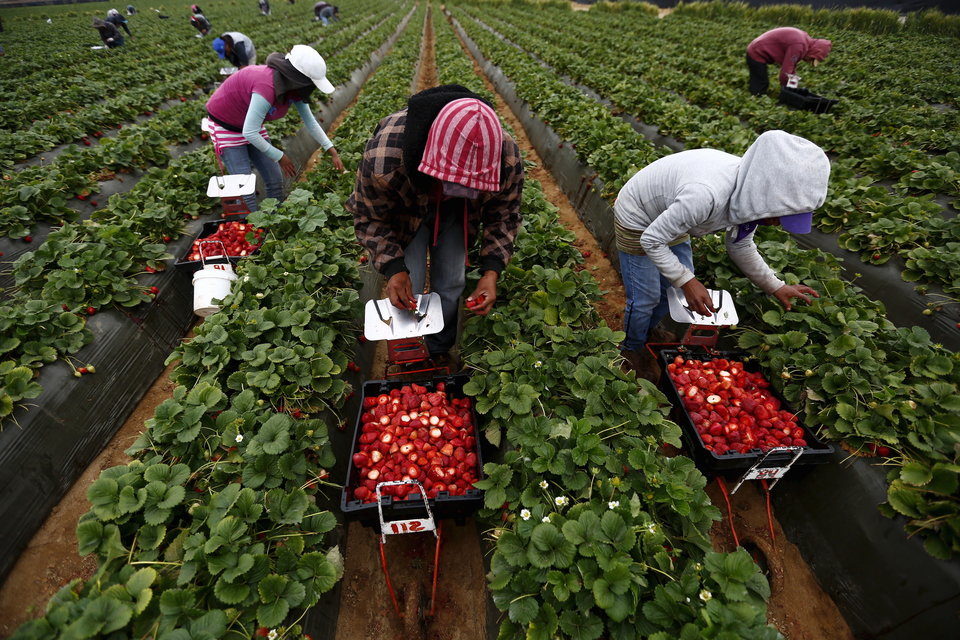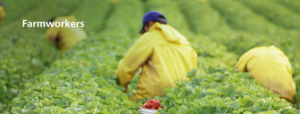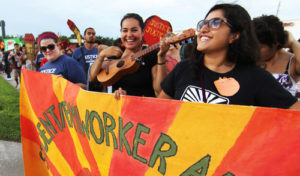About
In California, a blistered hand gently tosses a tomato into a harvest crate. In Maine, fingers work incredibly fast picking blueberries buried deep in the bushes. In New Jersey, kale leaves are snapped at the stem and formed into perfectly equal bunches for hours on end. The worker who harvested the produce in your cart last most likely labored in intense heat and received little to no water or rest breaks. As a nation we recognize that we could not maintain the food system that we do without migrant laborers, yet we do not honor them with basic working conditions or human rights.
One group of migrant laborers in Immokalee, Florida gathered together and formed the Coalition of Immokalee Workers, or CIW. The CIW campaign was rooted in asking corporate food buyers such as Wendy’s and Publix for one cent more per pound of tomatoes. The campaign wasn’t solely about the extra penny.
It was about spreading a belief that even as undocumented workers, people still deserved fair and humane treatment in the workplace. This message was broadcasted in hopes of changing corporate buying practices. Along the way, the campaign also hoped to shift consumer behaviors. If Americans heard the voices of those who picked their food, maybe they would be willing to change their food consumption to align with the Fair Food label. Communication theories shed light on changing behaviors, attitudes and beliefs of individual populations.
What
The goal of this project is to pull ourselves out of the capitalist quicksand that has evaded our lives: where we live, what we wear, and how we eat is drastically focused on profit, at the sacrifice of people. Now more than ever we need social justice and corporate social responsibility to re-imagine social, political and economic frameworks that build people up through social enterprise and sustainable, ethical capital.
In the US, we live in homes 3x larger than 60 years ago that use double or more the energy, and have an affordable housing and homelessness crisis. We drive bigger cars and have more consumer products such as cloths and appliances than ever before and yet we aren’t any happier. We have more food and calories available to us than ever before, but they are making us fat and sick instead of nourished and bountiful. Today we’re depleted financially, mentally and physically from paying student loans, mortgages, bills and working more hours than any other nation in the world.
Every human on earth is just doing their best to survive every day. In order to cut costs of living, the US has cheapened the cost of food production in hopes of making it more available to everyone. Unfortunately, the opposite has happened. The commercialism, capitalism and mono-cropping of our land has left us depleted- financially, nutritiously, and ethically.
Our food system has taken a disastrous turn in order to reduce costs, from the factory farming methods we’ve set up to produce animal proteins, to the illusion of “variety” with processed and packaged food items filled with corn, soy, wheat and oil (not to mention GMO’s, fillers, additives, preservatives, pesticides, toxins, etc.), to the modern-day slave labor conditions people work in on our American soil.
When
10 years ago in 2008, a film called Food Inc. raised many concerns about the food industry- exposing the most important part- that it is an industry more than it is a system setup to help nourish our country.
America = Industry $ > Healthy Food for All
….
10 years
….
A decade has passed, and an alarming amount of issues have stayed the same. I myself, as well as many other generations of children that have grown up in the United States since the 1960’s have gotten strong from eating off the backs of brown and color immigrants, most of whom are undocumented and from Mexico. International Media pays little attention to the brutal injustices and strife that migrant farm workers have endured in our country and worldwide.
Why
Inspiration for this project came partially from this reading this text, assigned by American University Professor Lauren Carruth.
The books about description puts it perfectly:
“The most effective solutions may well be found in people themselves, who consistently exceed the projections of experts and the medical-scientific, political, and humanitarian frameworks in which they are cast”.
This project is:
- supporting the existing efforts to improve migrant farm workers conditions and calling attention to this under-reported on issue, specifically the Fair Food Program
- using ethnographic and anthropological frameworks to study industry, people, economy, politics, culture and survival in the 21st century and generate questions about the food systems current human rights standards
- providing a “snapshot” of migrant farm workers in 2018 through news, interviews, exploration of administrative policies, literature, maps, and social media
- bringing to light the dark history of slavery in our nation and using media to start a conversation acknowledging that it still operates today
- providing education and growing public support for the Fair Food Program
- pressuring food retailers to become Fair Food Partners
- surveying the literature about what campaigns have been done, are in progress, and envisioning ways media and communication can be used as tools to improve the plight of migrant farm worker conditions globally
- shining light on the positive progress that has been made
- dismantling the notion that the United States’s values of democracy, freedom, and equality can be wholesome while 300+ million Americans eat the products of modern-day slave labor
- reminding people that
- slavery still exists, even in the USA
- we eat, therefore we are
- we’re all human


